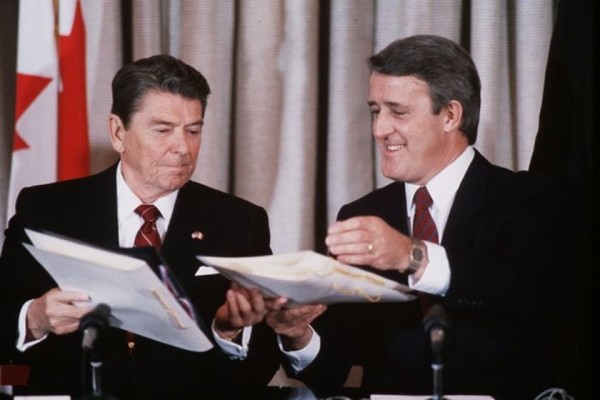-

The end of lean production and what’s ahead
The number of workers forming unions by National Labor Relations Board-supervised elections is growing, but it’s still far too slow to change the balance of power at the heart of the economy. As labour scholar Kim Moody writes, the collective awareness and coordinated use of positional power offers a powerful alternative route—and an additional organizing tool.
-

In blow to Canadian mining companies, Ecuador rejects international arbitration
Ecuador has historically spurned investor-state dispute settlement, a provision that allows companies to sue countries for alleged violations of trade agreements. This means companies can take states to court if their profits are put at risk by government policies. Since 1986, Ecuador has been forced to pay $10 billion for alleged breaches of its obligations to foreign investors.
-

Mulroney: Not all good
Much deserved praise has been heaped on Brian Mulroney’s legacy, but the universal lauding of NAFTA misses the mark. Mulroney made major contributions by pushing Washington to cut acid rain wafting across the border, was key to fixing the ozone layer in the Montréal protocol and took international leadership in helping end apartheid in South Africa.
-

Richard Sakwa: the Charter international system is in deep crisis
What is required to resolve the crisis is not a new international system but a new pattern in international politics. For that to occur leadership at the national and international level is required, accompanied by pressure from political associations and popular movements. This is the real revolution of our time.
-

The lost peace and the missing piece
The peace in Europe has been lost, decisively and for our generation almost certainly irrevocably, writes political scientist Richard Sakwa. As always, a peace lost here has global consequences. Equally, there was nothing predetermined about its loss. It was the result of decisions and calculations that in the end undermined the underlying rationality.
-

Shock therapy and Russia’s fatal turn
There are events that at the time seem to portend one thing but years later take on a very different hue. So it is with the dramatic political crisis that erupted in Russia 30 years ago this week, a crisis that ended with tanks of the Russian army blasting the country’s parliament, the Supreme Soviet, into submission.
-

G77+China: Should we care?
It seems to be the season of international summits. But which ones will matter most to the future of the planet? According to John Kirk and Stephen Kimber, the September 15-16 summit in Havana, with the unusual moniker of “Group of 77 plus China” may well ultimately turn out to be the most significant for the future of the Global South and, by extension, all of us.
-
_600_400_90_s_c1.jpg)
Rwanda is the ‘Wild West’ and should be removed from the mineral supply chain
Mark Twain, who wrote about thieves and conmen in America’s “Wild West,” famously said that a mine is a hole in the ground with a liar on top. If there is any country where Twain’s maxim has contemporary relevance, it is Rwanda. Over the last decade Rwanda has positioned itself as an exciting hub for producing and trading minerals essential to the global economy.
-

BRICS: Getting bigger, but is it any stronger?
The three-day summit of the BRICS leaders ends today. The BRICS are Brazil, Russia, India, China and South Africa. Russian leader Vladimir Putin was not present in person. The five BRICS nations now have a combined GDP larger than that of the G7 in purchasing power parity terms (a measure of what GDP can buy domestically in goods and services).
-

Fissures in the global order mean both risks and opportunities
Cracks in the US-EU alliance could mean political openings for the working classes living in the West as well as in Global South nations. In a world facing climate catastrophe, skyrocketing levels of inequality, the threat of more war and even a nuclear war, the costs of missing any such opportunity would be nothing short of tectonic.



